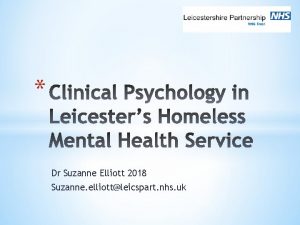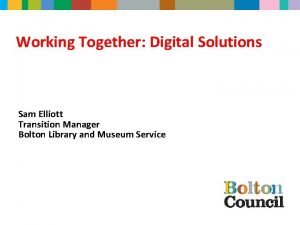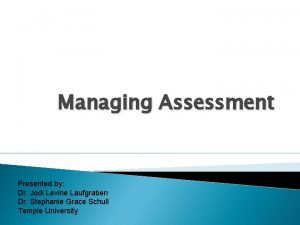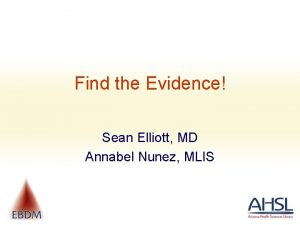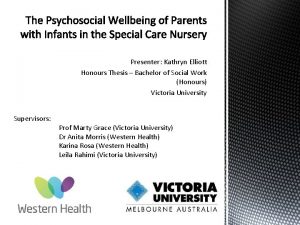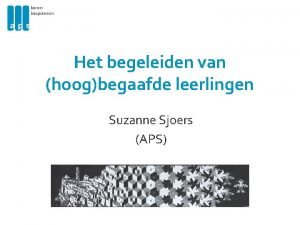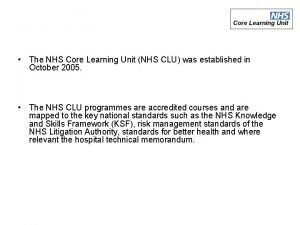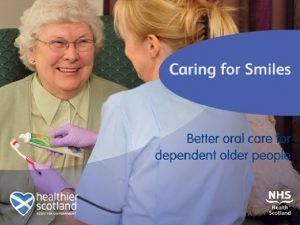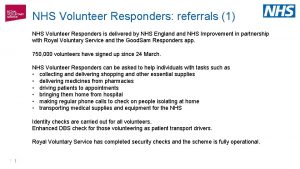Dr Suzanne Elliott 2018 Suzanne elliottleicspart nhs uk






























- Slides: 30

* Dr Suzanne Elliott 2018 Suzanne. elliott@leicspart. nhs. uk

*overview of the work in Leicester * the Homeless Mental Health Service (and it’s development) * Clinical Psychology provision *Developing innovations: * City-wide PIE * Street Outreach *



* Founded in 1990 * Dedicated Clinical Psychology provision for people who are homeless since 2000 * Team currently comprises: * 3 RMN * 1 Support, Time and Recovery worker * 1 Consultant psychiatrist 1 day a week * 1 junior psychiatrist ½ day per week * 1 clinical psychologist, 4 days per week * 1 trainee clinical psychologist 3 days per week * Team secretary 2. 5 days per week *

*Psychological assessment *Cognitive assessments *Brief psychological therapies *

*Psychological consultancy *Formulation & Care planning as part of MDT *Training & Supervision *Research & evaluation *Service development *


*The psychologically informed service… Is a service run according to the ‘emotional and psychological needs of service-users’ Enables service-users to make changes (eg in relationships/behaviour/emotions) Will reduce ‘chaotic behaviour’, evictions and hospital admissions Will increase service-users’ engagement with staff Also… * Could reduce referrals to mental health services? 9

*5 key areas 10 1. 2. Developing a psychological framework 3. 4. 5. Staff training and support The physical environment and social spaces Managing relationships Evaluation of outcomes

*2010 - invited to contribute to PIE guidelines *2012 - PIE guidelines published *2012 - Presentation to hostel managers across the sector in Leicester *

* 2012 - Develop 3 day training programme * 2013 - Pilot training followed by reflective practice with one team *

* 2014 - Roll out 4 day training across sector (training available to NHS staff in homeless sector, hostel staff, outreach workers, refuge workers, day centre staff and intensive floating support teams) * 2015 - initiate reflective practice groups at 3 other sites *

*Attachment theory / the impact of adverse childhood experiences / trauma informed practice *Narrative Approaches *Community Psychology *Active listening skills including boundaries and self-care *Emotional literacy and reflective practice *Outcomes and evaluation *Endings *

* Response-based approaches (based on Alan Wade’s work) Homelessness and brain injury * Understanding Dual diagnosis * Understanding ‘Psychosis’? * Failure conversations (based on Michael White’s work) * Homelessness and gender diversity * Understanding ‘personality disorder’? * Homelessness and Motivational interviewing * Understanding ‘PTSD’? * The impact of trauma on parenting *

*In collaboration with University of Leicester *Monthly reflective practice groups offered to 5 organisations *Facilitated by a qualified clinical psychologist alongside a second year trainee clinical psychologist or two final year clinical psychology trainees *Monthly supervision for trainees *

*University of Leicester facilitates supervision for qualified clinical psychologists offering reflective practice *University also hosts EMids Reflective Practice Research Network- pooling data across reflective practice groups *

EMERGING EVALUATION *positive use of staff time *relevant to the day to day experience of staff members *quality of the training and the knowledge and skills of the individuals presenting the training were high *knowledge increased significantly for each individual training session *Fostered curiosity and reflection *

POSSIBLE IMPROVEMENTS *Private, undisturbed venues away from clinical contact and day-to-day responsibilities should be considered *Employing a variety of tasks that support different learning styles and preferences, including more practical tasks *Ensure IT resources are working adequately *

CHALLENGES *existing research relating to the implementation of PIE principles focuses on a single centre service (eg Westway, Nolte & Brown, 2017) *Services running on skeleton staff who work shifts *Culture clashes: can reflective practice be done anywhere? Do we have to sit in a circle? *

CHALLENGES *spread of services / funding bodies means that achieving a consistent approach to providing services to people who are homeless is very challenging *Embedding PIE into service strategic planning, policies and procedures *


*Just PR? *gaining entry into the rough sleeping community *making mental health conversations possible and acknowledging trauma *demystifying and raising awareness of mental health services *starting conversations about aspirations, values and what is important to people rough sleeping. *

*Based on model developed by Ma. C-UK * taking psychology to the streets * having conversations that are therapeutic * * Who is this person? * What are their ethics for living? * What are they passionate about? * What do they give value to in life? * What are their dreams?


*Also, importantly, it has brought our two teams closer which has had very positive outcomes, from my perspective anyway, for service users and for us as co-workers. My hope is that we can find a way of continuing with it despite all the nonsense that goes on in our organisations. *

SERVICE USER FEEDBACK *Referrals *Myths about mental health services were dispelled *Increased understanding of a psychological approach *

OUTREACH WORKERS FEEDBACK *We need more *improved knowledge/awareness of mental health which invited outreach workers to have confidence in sharing with rough sleepers *Increased awareness of barriers to accessing support *Increased awareness of psychologists of ‘real world’ circumstances of people who sleep rough *

PSYCHOLOGISTS FEEDBACK *Increased awareness of psychologists of ‘real world’ circumstances of people who sleep rough *Stepping out of therapy room *The potential for research/evaluation *Bringing the street community together *

* Suzanne. elliott@leicspart. nhs. uk
 Dr suzanne elliott
Dr suzanne elliott Que letra continua m v t m j
Que letra continua m v t m j Elliott business software
Elliott business software Pierre elliott trudeau high school
Pierre elliott trudeau high school Pargo v elliott
Pargo v elliott Elliott lancaster
Elliott lancaster Penfolds wine v elliott
Penfolds wine v elliott Ecole pierre elliott trudeau
Ecole pierre elliott trudeau Digital solutions bolton
Digital solutions bolton Sandy elliott
Sandy elliott Dr elliott mayo clinic
Dr elliott mayo clinic Jodi levine laufgraben
Jodi levine laufgraben Mrs elliott a teacher at durham school of the arts
Mrs elliott a teacher at durham school of the arts Dana elliott
Dana elliott Joseph elliott actor
Joseph elliott actor Michael elliott md
Michael elliott md Timo elliott sap
Timo elliott sap Kathryn elliott
Kathryn elliott Pierre elliott trudeau high school
Pierre elliott trudeau high school Elliott cheu
Elliott cheu Pierre elliott trudeau high school courses
Pierre elliott trudeau high school courses Clark elliott depaul
Clark elliott depaul Elliott erwitt biography
Elliott erwitt biography Suzanne hoadley
Suzanne hoadley Suzanne kapelari
Suzanne kapelari 5 petit singe saute sur le lit paroles
5 petit singe saute sur le lit paroles Lancaster malattia
Lancaster malattia Suzanne sjoers
Suzanne sjoers Suzanne sensabaugh
Suzanne sensabaugh Suzanne wayne
Suzanne wayne Suzanne gray
Suzanne gray
